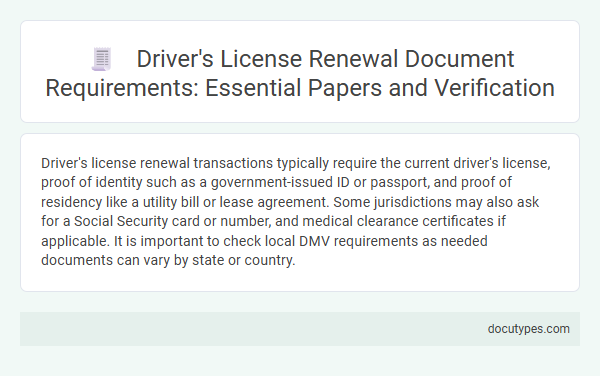Driver's license renewal transactions typically require the current driver's license, proof of identity such as a government-issued ID or passport, and proof of residency like a utility bill or lease agreement. Some jurisdictions may also ask for a Social Security card or number, and medical clearance certificates if applicable. It is important to check local DMV requirements as needed documents can vary by state or country.
Introduction to Driver's License Renewal Document Requirements
Renewing a driver's license requires submitting specific documents to verify identity, residency, and eligibility. Required documents often include a current driver's license, proof of address, and additional identification such as a birth certificate or passport. Understanding these document requirements ensures a smooth renewal process without delays.
Essential Identification Papers for License Renewal
Essential identification papers are required for driver's license renewal transactions to verify your identity and residency. Commonly accepted documents include a valid passport, birth certificate, or a government-issued ID card, alongside proof of current address such as a utility bill or lease agreement. Presenting these documents ensures a smooth and efficient renewal process, preventing delays or application rejection.
Proof of Residency: Accepted Documents
Proof of residency is a mandatory requirement for driver's license renewal transactions to verify the applicant's current address. Accepted documents must be valid, recent, and clearly show the applicant's name and address.
- Utility Bills - Recent utility bills such as electricity, water, or gas statements serve as valid proof of residency.
- Bank Statements - Bank or credit card statements issued within the past 60 days are accepted for address verification.
- Lease or Rental Agreements - A current and signed lease or rental contract can be submitted as evidence of residency.
Social Security Number Verification
Social Security Number (SSN) verification is a crucial requirement for driver's license renewal transactions. Proof of your SSN must be provided to confirm identity and eligibility.
Acceptable documents include your Social Security card, a W-2 form, or a pay stub displaying the SSN. These documents ensure compliance with state and federal regulations during the renewal process.
Expired vs. Valid License Considerations
Driver's license renewal requires specific documents depending on the status of your current license. If the license is expired, additional proof of identity and residency may be necessary compared to a valid license renewal.
Valid license holders typically need to present the existing license and a proof of residency document. Expired license renewals often demand more extensive verification, such as a birth certificate or social security card, alongside proof of residency.
Renewal Requirements for Non-Citizens and International Drivers
| Document Type | Description |
|---|---|
| Proof of Identity | Valid passport or government-issued ID confirming your identity and legal name. |
| Proof of Legal Status | Visa, permanent resident card, work permit, or other documents verifying legal residency or immigration status. |
| Current Driver's License | Original or expired driver's license from the issuing authority to validate previous driving privileges. |
| Proof of Residency | Utility bill, rental agreement, or official mail confirming current residential address within the licensing jurisdiction. |
| Social Security Number (SSN) or Equivalent | Social Security card or an official letter confirming the absence of SSN if applicable for non-citizens. |
| International Driving Permit (IDP) | Required for international drivers to accompany a valid foreign driver's license, if applicable. |
| Medical or Vision Report | Recent medical certificate or vision test report verifying fitness to drive, if required by the local DMV or licensing authority. |
| Renewal Application Form | Completed application form specific to driver's license renewal, available from the DMV or licensing website. |
Acceptable Secondary Forms of Identification
Acceptable secondary forms of identification are essential for driver's license renewal transactions. These documents verify your identity when primary identification is unavailable or insufficient.
Common acceptable secondary IDs include a passport, birth certificate, or Social Security card. Other documents such as utility bills, bank statements, or insurance cards may also be accepted depending on state regulations. Always check specific requirements to ensure your documents meet the renewal criteria.
Name Change Documentation for License Renewal
What types of name change documents are required for driver's license renewal? You must provide legal proof such as a marriage certificate, court order, or divorce decree when renewing your license after a name change. These documents verify your updated identity information for official records.
Special Circumstances: Lost or Stolen License Protocols
Renewing a driver's license involves specific document requirements, particularly in special circumstances such as lost or stolen licenses. Understanding the correct protocol ensures a smooth renewal process without unnecessary delays.
- Police Report - A filed police report is often required to verify the loss or theft of the original driver's license.
- Proof of Identity - Government-issued identification documents, such as a passport or birth certificate, must be presented to confirm the applicant's identity.
- Affidavit of Loss - Some jurisdictions require a sworn affidavit detailing the circumstances of the lost or stolen license to prevent fraudulent use.
Submitting these documents promptly facilitates efficient reissuance of the driver's license under lost or stolen conditions.
What Types of Documents Are Required for Driver’s License Renewal Transactions? Infographic

